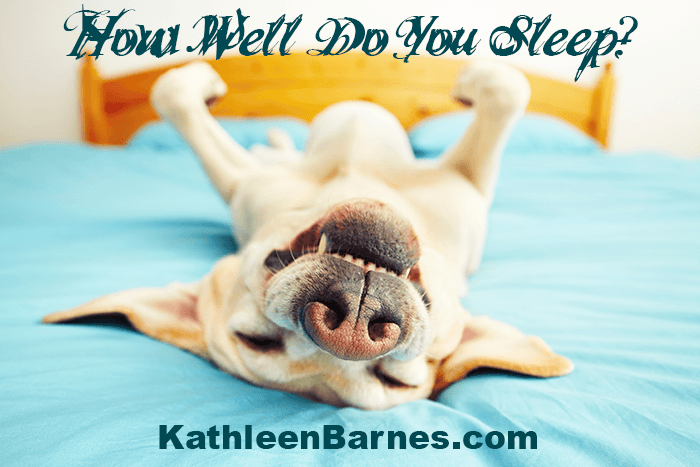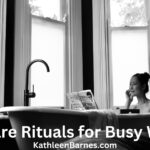I recently acquired a fitness band.* It’s certainly a love-hate relationship. Not only does it tell me how many steps I have taken in a given day (averaging over 12,000!), it monitors my sleep.
That’s the not-so-good part. Despite the fact that the monitor sometimes thinks I am up for the day and I’ve only been asleep for two hours if I go to the bathroom at 1 a.m., it also shows the amount of time I spend awake and the time I am in light sleep and deep sleep.
OK. I’m probably obsessing about this, but it seems I spend a lot of time in bed (usually at least eight hours a night) and I spend a lot more time lying awake at night than I realize (about two hours at latest count).
That means my sleep quality is less than optimal.
Why is that important?
Because not only is sleep deprivation linked to lack of daytime focus, obesity and diabetes, it is also linked to memory loss. Who wants that?
I’ve been taking melatonin for years, but on a recent trip to Peru, I forgot my melatonin, so I didn’t take it for more than two weeks. Strangely, I slept better without the melatonin, so I’ve dropped it unless I’m crossing multiple time zones and dealing with jet lag.
I do find that valerian helps bring about sleep on occasion. I’ve also started taking angelica so my bladder doesn’t wake me up numerous times every night.
So what’s behind the poor sleep cycle?
It could be sleep apnea (breathing obstruction), although I doubt it. Various roommates in hotels rooms say I do not snore, the most common manifestation of sleep apnea, despite the accusations from my husband, who snores like a chainsaw and wakes himself up.
It could be stress. Certainly, I know I do have nocturnal replays of conversations during the day, disagreements or worries about any number of personal matters. But those wakeful nights are infrequent.
I also know that light in the bedroom disrupts the body’s natural melatonin production that is key to deep sleep cycles. Our bedroom is pretty dark after my husband goes to bed, but since he usually turns in an hour or two later than I do, a lamp remains on until he comes to bed. That light probably plays a role in my less-than-optimal sleep. I think a flashlight may be in his Christmas stocking.
It doesn’t help that our three dogs feel obligated to protect us against axe murderers with bouts of frenzied barking several times a night.
Plus I am a woman over 50. Whoops– over 60. Hormonal fluctuations definitely play a role in sleep patterns. While I do take bio-identical hormones, I think this is a sign it is time for me to have my hormone levels re-tested.
Another sleep disruptor: Before bedtime activities. (No, I wasn’t talking about that, but you should know that sex is actually a sleep enhancer!) I am an unabashed fan of Scandal. And it comes on late at night, so I am pretty wired up when I try to sleep immediately after a wild and crazy ride with Olivia Pope. Alas, Olivia is going on the DVR. I’ll watch her on rainy Saturday afternoons. Over-stimulation obviously leads to poor sleep, so that includes bedtime reading, exercise and stimulating conversations.
I’m not an after dinner snacker, but we are frequently guilty of late dinners due to evening meetings or other exigencies. I know, all eating should be finished at least two and preferably three hours before bed.
I don’t have classical insomnia. Like many people, I have disrupted sleep patterns. In writing this. I’ve ferreted out several ways I can improve my sleep quality and my health in the long run.
How about you? You know I love to hear from readers.
*BTW I bought a Jawbone Up fitness band precisely because it must be connected to my phone to be read. I didn’t want one that was constantly wirelessly in contact with my phone by Bluetooth because of the exposure to the electromagnetic frequencies (EMFs) generated by phones when they are communicating.








Ahh, the sleep issues…I remember good sleep before menopause kicked in. Then it became fitful with some restless nights. And restless legs with occasional Charley horse cramps upon getting up. Ok, My hubby says I do snore some, but then I had a nasal septal repair with residual Rt sided nasal collapse during the night which leaves me with 50% breathing in and out capacity. So, what do I do? I bought Xlear nostril spray which works fine for a couple hours, then I resort to Afrin spray which works fine but also is not recommended for ongoing use. Between this and 1 tylenol or Advil PM at bedtime, with 1-2 bathroom trips per night, my sleep time is satisfactory. However, my new prevention its- minded D.O. Wants me to get off the Afrin and use Flonase or Nasacort. I got the latter but am not fond of it. The Afrin works better. Also, about Melatonin, Valerian, Hops, etc, these have not ever worked to sustain good sleep, so they sit On the shelf for my next trial, if ever. And no, I do not want Rx sleep meds. I’ll keep on my current routine, unless someone can suggest a better one. Maybe, after awhile, I’ll go see my ENT again….